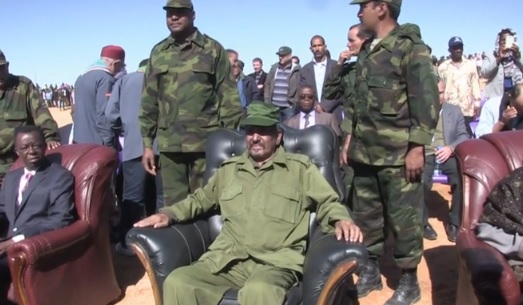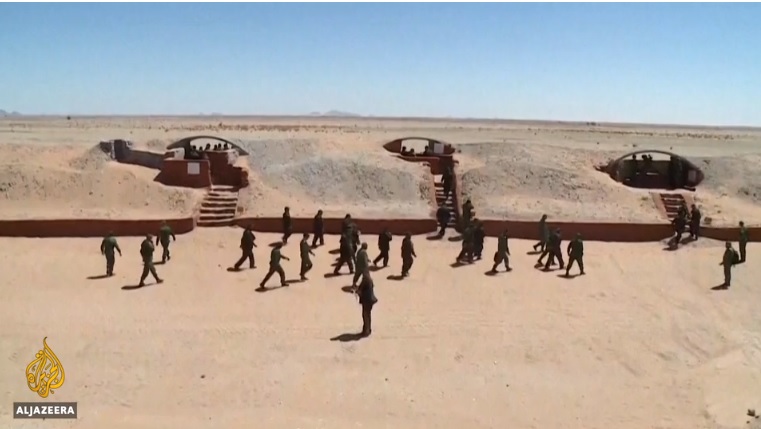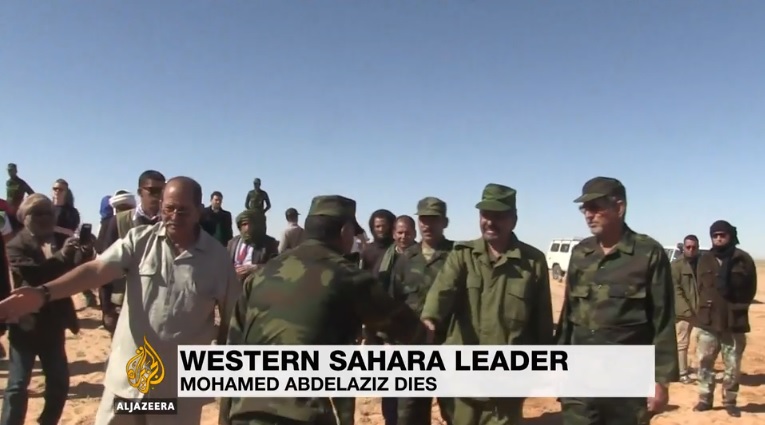Aljazeera
The recent violence in West Sahara marks a collapse of a 29-year ceasefire in the disputed territory.
The call was scheduled in advance on November 13 at 18:00 GMT.
But that day, Omar Sidi and UN Secretary-General Antonio Guterres had to change the premise of their conversation from questions of sovereignty over the disputed territory of Western Sahara to managing the crisis unfolding on the ground, where flares of violence between the Polisario Front – which Sidi represents at the UN – and Morocco erupted that morning.
KEEP READING
Will Morocco and the Polisario Front go to war?Algeria summons Moroccan ambassador over ‘enemy country’ remarkMorocco troops launch operation in Western Sahara border zone
Morocco had already spoken to the secretary-general about the issue but said it set up a “security cordon” over what it claims was the Polisario militia presence blocking the Guerguerat crossing, situated on an important trading road with neighbouring Mauritania.
“In the face of provocations from the militias of the Polisario, the Kingdom of Morocco had no other choice but to assume its responsibilities in order to put an end to the deadlock situation generated by these actions and restore free civil and commercial movement,” the Moroccan ministry of foreign affairs said in a statement.
Omeima Abdeslam, Polisario’s UN ambassador working on human rights in Geneva, said the October 21 road blockade was conducted by protesting civilians and it had no involvement.
“[Morocco’s] operation breached the ceasefire agreement, it wasn’t us that conducted a military operation,” said Sidi, referring to the crossing of the Moroccan army past the Berm, a 2,700km (1,677-mile) sand wall that separates areas controlled by Polisario and Morocco in Western Sahara.
The recent violence in Western Sahara marks a collapse of a 29-year ceasefire between the pro-independence Polisario Front and the pro-autonomy Kingdom of Morocco, mirroring the repeated diplomatic failures of the two parties – and of the international community – to broker a sustainable peace agreement over who controls the territory.
“The secretary-general remains committed to doing his utmost to avoid the collapse of the ceasefire,” said Stéphane Dujarric, Guterres’s spokesman, in a statement that followed the clashes.

The conflict ignited after Spain’s colonial withdrawal from the region in 1975, leaving Mauritania, Morocco and the Polisario Front in an entrenched conflict over the sovereignty of the territory.
The same year, the International Court of Justice, while recognising Morocco and Mauritania’s historical ties to the area, filed an advisory opinion which stated those ties, which are central to Morocco’s sovereignty claim, did not amount to ownership over the territory.
The Polisario Front, which represents the Sahrawi Arab Democratic Republic from exile in Tindouf, Algeria, made peace with Mauritania in 1979. But pockets of fighting with Morocco continued until 1991 when the two parties reached an agreement which called for – among preserving the status quo of the time and the implementation of a UN-backed buffer zone – a referendum to be held.
After the 1991 agreement, Morocco controlled the majority of the territory, which stretches little more than the size of Britain.
MINURSO, the UN peacekeeping mission responsible for organising the referendum, brokered a deal in 1997 with the help of the US, which called for a vote that would give Sahrawis, the land’s Indigenous people, a choice between self-determination and autonomy under the Moroccan monarchy.
But Morocco refused the terms of the referendum, citing its dissatisfaction with who was allowed to vote.
Electoral lists have been a major point of contention, especially since there have been attempts on both sides to shift the demographics of the territory in order to influence the results of the referendum. After 1975, Morocco has resettled hundreds of thousands of Moroccans in Western Sahara, making up at least two-thirds of its half a million inhabitants.
In 2000, the first of the two Baker peace initiatives were launched by US diplomat James Baker, who proposed an autonomy referendum solution, where the Indigenous Sahrawis would live under the Moroccan monarchy, conceding only their defence and foreign policy attribution to the king.
The plan was never formally presented to the Security Council and was rejected by Polisario because it did not offer the option of independence – an imperative for the group. Then followed the Baker II plan in 2003, which proposed a five-year autonomous rule that would see a subsequent vote in an independence referendum.
The referendum would have given the right to vote to everyone living in Western Sahara, even the Moroccans that were settled there after 1975, something Polisario never agreed to before. The Security Council agreed to it and asked the parties to implement it but with no avail, as Morocco excluded the possibility of a referendum that would grant Sahrawis independence.

Another failed attempt at mediation followed between 2007 and 2008, which has brought the diplomatic process to an impasse, one where Morocco does not accept self-determination and Polisario does not accept autonomy.
“There were so many diplomatic and bureaucratic obstacles to the implementation of the referendum that it has become unattainable,” said Riccardo Fabiani, North Africa director of the International Crisis Group.
Algeria has been Polisario’s main backer and present in most talks about the diplomatic struggle for sovereignty, which has triggered questions about whether Western Sahara is a proxy for a wider regional struggle for influence.
Pablo de Orellana has researched diplomatic strategies of both sides of the conflict. The King’s College London scholar told Al Jazeera that pushing a narrative that framed Polisario as illegitimate separatists controlled by Algeria has helped cement Morocco’s dismissal of the movement for independence internationally.
“By banging on and using the word separatist for 20 years it’s started to work,” said de Orellana.
A spokesperson for Morocco’s mission at the UN declined to comment on the matter, pointing towards written statements.
The official stance of the Moroccan government is that “Algeria’s official communication to the United Nations shows that this country presents itself sometimes as ‘a concerned party,’ other times as an ‘important actor,’ or as a ‘party’ in the settlement of the dispute,” according to a 2004 official Moroccan memorandum.
While Algeria has had strong stakes in the conflict as the main supporter of Polisario’s claim for independence, de Orellana believes Morocco’s continuous narrative that Polisario is an Algerian plot is a diplomatic communications strategy, meant to delegitimise the independence movement.
“Morocco is not negotiating because nobody is forcing Morocco to negotiate. It wants to keep the status quo and is very slowly pushing to the world the believe that Western Sahara is its own,” he said.
Morocco has recently opened consulates and embassies in the territory, trying to bolster its sovereignty claim with international support. The strategy has been effective: Out of 84 countries that previously recognised Polisario, 44 recently rescinded their support and recognition.
“Morocco has gradually, slowly and progressively succeeded in its attempt to legitimise its claim over tweshe territory,” said George Joffé from Cambridge University. “It’s very unlikely that any institution can change that.”
Even though it continues to have support for a referendum with a choice for independence, the UN’s position and that of the international community has recently shifted towards Morocco, said Crisis Group’s Fabiani, concurring that Morocco’s diplomatic communications strategy is working.
While Morocco keeps its silence, Polisario is doing the opposite, attempting to garner international attention and support from the UN to bring back discussions for a referendum.
The conflict comes amid a vacuum of international leadership and authority over the conflict, in which UN Secretary-General Guterres has not named a special envoy for Western Sahara for more than a year.
According to analysts and academics Al Jazeera spoke to, Polisario’s decision to engage in the conflict and leave the agreement at this moment is part of its strategy to garner attention to a cause that seems to have been forgotten.
“They’ve used this occasion as a means to pressure the secretary-general to take a more positive stance in terms of resisting the Moroccans,” said Joffé.
When asked about the conflict, Abdeslam, Polisario’s UN diplomat in Geneva, told Al Jazeera she is disappointed with the UN’s inaction, stressing they will continue to fight until something is done.
“The hate our people have in their hearts is bigger than whatever guns Morocco has,” said Abdeslam.

photo



